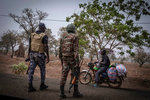

COTONOU, Benin (AP) — It’s been more than a year since jihadis first stormed Igor Kassah's town in northern Benin but the priest still lives in fear. His once peaceful life is now marked by threatening phone calls and Islamic extremist diatribes tacked on church doors demanding that people leave. He is haunted by the bodies he has seen of those killed in the attacks.
“We no longer have a normal life,” the 41-year-old said through text messages to The Associated Press. “It’s hard to talk and act confidently because you don’t know who’s in front of you anymore.”
Violence by extremists linked to al-Qaida and the Islamic State group has wracked much of West Africa's inland Sahel region for more than seven years. Now it is spreading into the coastal states with Benin the hardest hit, say experts.
Jihadi attacks in Benin have spiked more than tenfold between July and December compared to the same period last year — from 2 to 25 — according to the Armed Conflict Location & Event Data Project. This is more than any other coastal state in West Africa. If the extremist violence continues to spread it could have far-reaching consequences, say analysts.
“When you talk about the Sahel, geopolitical interests are limited,” said Kars de Bruijne, senior research fellow with Clingendael, a Dutch-based research organization.
“But it’s different for coastal states, which are economically much stronger and more important to the African Union and Western countries such as England and the United States,” he said. These Western powers might see their interests at stake, which is a key reason why they should be really concerned about the spillover of extremist violence into Benin, he said. The more fronts the jihadis open, the more difficult it will be to effectively respond, he said.
The violence in Benin, a country of 12 million people, is largely a result of what's happening in neighboring Burkina Faso, where jihadi attacks have killed hundreds and displaced nearly 2 million people. Attacks were initially confined to the border between eastern Burkina Faso and Benin in the W and Pendjari National Parks in the Alibori and Atacora regions, but are now expanding. Incidents have increased since June in populated areas around the parks with jihadis connected to the al-Qaida-linked group known as JNIM pushing Benin's military from the border creating a security vacuum and taking control of part of the country, said a recent report by Clingendael.
The jihadi rebels appear to be creating a large area of influence from Niger to Togo in order to keep supply lines open, recruit people and procure material, say analysts. Another aim could be to withstand pressure from the Accra Initiative, a military platform involving Burkina Faso and coastal countries to prevent the further spread of extremism from the Sahel.
Benin's government has ramped up its response investing nearly $130 million to create new operating bases, fortify existing ones and recruit nearly 4,000 security forces since last year, Benin’s President Patrice Talon said in a speech earlier this month.
Meanwhile, communities in Benin say they are being forced to accept a life they never thought they'd have to endure.
“We thought for a moment, perhaps because of a certain naivety ... that (we) could escape the situation of threats, of near-daily attacks that (Benin) is undergoing,” said Arnaud Houenou an expert in national security and a professor at Benin's University of Abomey Calavi.
“Benin has been spared the terrorist war in the Sahel despite its proximity to Nigeria and Burkina Faso," he said. "But reality has set in.”